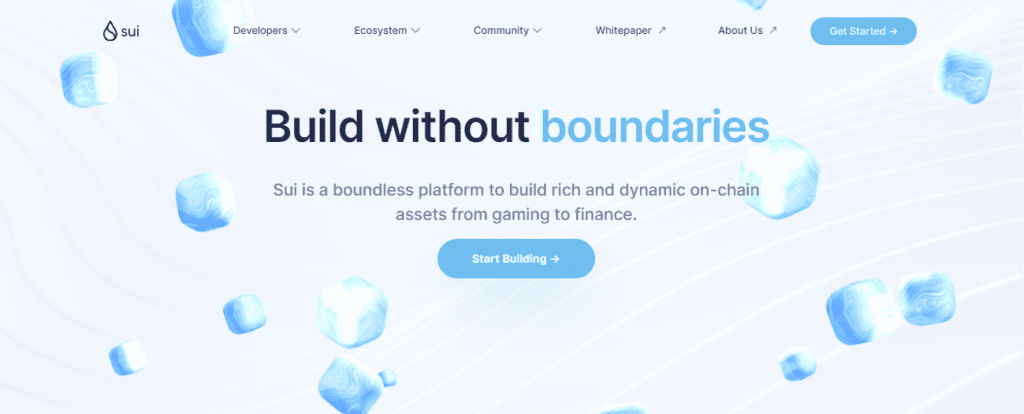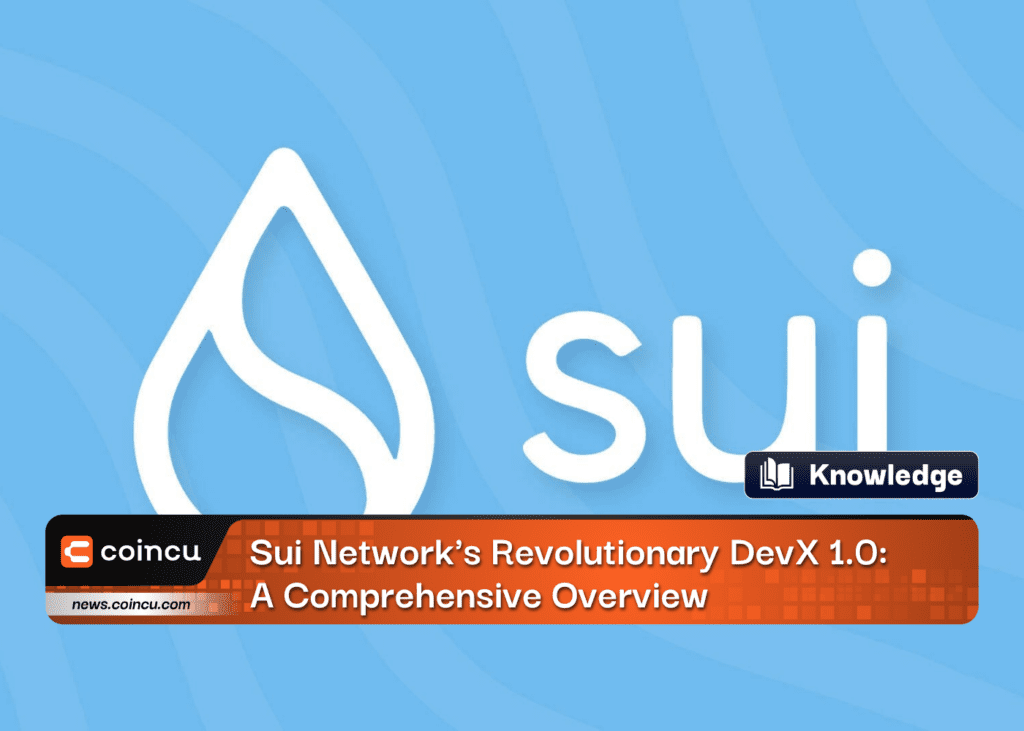Sui Network’s permanent testnet brings new core network improvements, such as a dynamic validator set and address updates. Developers can also expect new primitives to enhance their experience. Explore Sui’s developer-friendly platform now.
Introduction

What is Sui
Sui is a smart contract platform maintained by a permissionless set of validators that play a role similar to validators or miners in other blockchain systems.
Sui offers scalability and unprecedented low latency for simple use cases. Sui makes most transactions processable in parallel. This better utilizes processing resources and offers the option to increase throughput by adding more resources. Sui forgoes consensus to instead use simpler and lower-latency primitives for simple use cases, such as payment transactions and asset transfers. This is unprecedented in the blockchain world and enables a number of new latency-sensitive distributed applications ranging from gaming to retail payment at physical points of sale.
Sui is written in Rust and supports smart contracts written in Sui Move, a dialect of the Move programming language, to define assets that may have an owner. Sui Move programs define operations on these assets, including customs rules for their creation, the transfer of these assets to new owners, and operations that mutate assets. To learn about the differences between core Move and Sui move, see How Sui Move differs from Core Move.
Sui tokens and validators
Sui has a native token called SUI, with a fixed supply. The SUI token is used to pay for gas, and users can stake their SUI tokens with validators in a Delegated Proof-of-Stake model within an epoch.
The voting power of validators within this epoch is a function of the amount of SUI in their staking pool, including both the validator and user SUI tokens. In any epoch, the set of validators is Byzantine fault tolerant. At the end of the epoch, fees collected through all transactions processed are distributed to validators according to their contribution to the operation of the network. Validators can share some of the fees as rewards to users that stake their SUI with them.
Sui is backed by a number of state-of-the-art peer-reviewed works and years of open-source development.
Sui highlights
- Unmatched scalability, instant settlement
- A safe, smart contract language accessible to mainstream developers
- Ability to define rich and composable on-chain assets
- Better user experience for web3 apps
- Narwhal and Bullshark DAG-based mempool and efficient Byzantine Fault Tolerant (BFT) consensus
Sui is the only blockchain today that can scale with the growth of web3 while achieving industry-leading performance, cost, programmability, and usability. We see Sui as the first internet-scale programmable blockchain platform, a foundational layer for web3.
The launch of the Permanent Testnet and the purpose of the testnet
Sui Network recently announced on their official Twitter account the launch of the Permanent Testnet.
This decentralized and permissionless testnet is designed to operate for a long time after the main network is launched. Unlike previous Waves 1 and Waves 2 testnets, this new testnet is permanent and will continue to operate, bringing many important functional updates to the community.
Core Network Improvements
Dynamic Validator Set
One of the notable updates on the core network is the dynamic validator set. Candidate validators who meet sufficient equity requirements can join the network at the epoch boundary, while active validators can leave the network at the same time. This validator access model is truly permissionless, providing a more equitable and inclusive network environment.
Support for Protocol Software and Sui Framework Upgrades
Another important improvement is the support for protocol software and Sui framework upgrades. Unlike Devnet, Testnet will not be deleted on every software update unless there is a special reason. The community will be notified beforehand of any software update or data deletion on Testnet, ensuring that users are well-informed of the changes.
Restoring Full Nodes from Database Snapshots
Restoring full nodes from database snapshots is a feature that node runners can take advantage of. This tool enables them to quickly start full nodes instead of waiting for them to sync, saving time and improving efficiency.
Address and Signature Updates
Address and signature updates are also implemented to prevent hash collisions. Account addresses, object IDs, and transaction IDs are upgraded from 20 to 32 bytes, making it difficult for hash collisions. Sui’s default hash function is now Blake2b instead of SHA3 because Blake2b is more performant. To support a wide range of transaction sizes, signatures are now applied to hash digests rather than serialized BCS data. This makes Sui compatible with hardware wallets whose signer API typically allows inputs of limited size.
Aside from the core network improvements, developers can also expect improvements to their experience through the introduction of the programmable transaction block, sponsorship transaction and gas station, object display standard, kiosk standard, RPC transformation, zero-knowledge proof, timestamps with two granularities, and Move package upgrade. These updates provide more versatility, privacy-preserving applications, and faster transactions for developers.
Sui Network encourages builders to use local environments for initial development and faster iterations while Devnet and Testnet remain available for further development and testing. This strategy is aimed at enhancing the developer experience and make Sui Network the most developer-friendly platform in the public chain.
Developer Experience
Sui, a blockchain platform, has set its sights on becoming the most developer-friendly platform on the public chain. To achieve this goal, the team at Sui has been working diligently to create an environment that is conducive to developers and builders. To this end, Sui has established a permanent testnet, which serves as the earliest incarnation of Sui DevX 1.0.
Sui DevX 1.0 is a collection of core developer primitives and semantics that are essential for building efficient and effective applications on the Sui blockchain. The platform has focused on several key areas to make its DevX offering stand out from the rest.
- Firstly, Sui has been actively seeking feedback from developers and builders throughout the development process. This approach allows the team to gain insight into what works and doesn’t work and helps them make informed decisions about improving the developer experience.
- Secondly, Sui is committed to continuously refining the basic elements of developer efficiency. This includes creating an intuitive user interface, providing comprehensive documentation and support, and offering tools that streamline the development process. By doing so, Sui aims to make it easy for developers to build high-quality applications on its platform quickly.
- Finally, Sui has designed its ecosystem to be decentralized but not fragmented. This means the platform is built on a decentralized architecture, allowing for greater flexibility and innovation. At the same time, Sui has put measures in place to ensure that the ecosystem remains cohesive and unified, allowing developers and builders to work together seamlessly.
Other Improvements
Sui is committed to providing the most developer-friendly platform in the public chain, and the permanent testnet serves as the earliest incarnation of Sui DevX 1.0. It brings together many core developer primitives and semantics, including the following features:
- Programmable Transaction Block
- Sponsorship Transaction and Gas Station
- Object Display Standard
- Kiosk Standard
- RPC Transformation
- Zero-knowledge Proof
- Timestamps with Two Granularities
- Move Package Upgrade
| Programmable Transaction Block | There are now more aggregation-based RPC get* methods and JSON RPC batch requests are deprecated in favor of the MultiGet* methods. System events are deprecated in favor of dedicated fields in transaction responses. Finally, some legacy RPC methods (marked with unsafe_*) are deprecated in favor of programmable transaction blocks. |
| Sponsorship Transaction and Gas Station | The sponsorship transaction feature has been supported since SUI version 0.27, and Shinami’s gas station now works with Sui’s permanent testnet. |
| Object Display Standard | The Object Display Standard is a set of named templates that standardize the off-chain display of objects of the same type. Both Sui Browser and Sui Wallet now support this standard, as do the Sui API and Typescript/Rust SDK. It was a collaborative effort with many ideas and brainstorming from the Sui community. |
| Kiosk Standard | Kiosk is a powerful new primitive that enables listing objects for sale and enforcing a creator-defined royalty policy when an object is sold. The combination of Object Display and Kiosk fills two key gaps where people are building collectibles and trading platforms on Sui. Ecosystem wallets, browsers, and marketplaces are encouraged to explore object display standards and kiosk standards for seamless compatibility across the ecosystem. |
| RPC Transformation | There are now more aggregation-based RPC get* methods, and JSON RPC batch requests are deprecated in favor of the MultiGet* methods. System events are deprecated in favor of dedicated fields in transaction responses. Finally, some legacy RPC methods (marked with unsafe_*) are deprecated in favor of programmable transaction blocks. |
| Zero-knowledge Proof | Move API now supports verifying Groth16 ZKPs using BN254 elliptic curves and BLS12-381, enabling proof of computation in Sui smart contracts and privacy-preserving applications. |
| Timestamps with Two Granularities | Sui’s fine-grained Clock module supports 2-3 second granularity for near real-time applications and a coarse-grained Epoch timestamp. |
| Move Package Upgrade | This feature enables developers to upgrade their Move smart contracts and import related packages, and it will be available on testnet with the next software update. |
In addition to using Devnet and Testnet, developers are encouraged to use local environments for initial development and faster iterations. The sui-test-validator binary has been improved to aid local development.
Sui Devnet versus Testnet
| Attribute | Devnet | Permanent Testnet |
| Validator set | Four Mysten Labs-operated validators | 93 validators + 2 Mysten Labs-operated validators |
| Full node | Mysten Labs-operated plus community operated nodes | Mysten Labs-operated plus community operated nodes |
| Validator location | US-East | Geo-distributed |
| Duration | Permanent | Permanent |
| Access | Public | Public |
| JSON API URL | https://fullnode.devnet.sui.io:443 | https://fullnode.testnet.sui.io:443 |
| Faucet Unit | 1 SUI per request | 1 SUI per request |
| Epoch Duration | 24 hours | 24 hours |
| Reference Gas Price | 1 MIST | Starting epoch 0 at 1,000 MIST. Afterwards, the reference gas price will update as validators participate in the gas price survey throughout each epoch. |
| Storage Gas Price | 1 MIST | 76 MIST |
| SW Version as of March 29, 2023 | v0.29.1 | v0.29.1 |
| Release Cadence | Weekly release plus more frequent hot-fixes as necessary | Only updated as necessary for the immediate future. A regular release schedule will be announced once it has been established. |
| Data Durability | Data wiped as part of regularly scheduled software updates | No data wipe as part of software updates. Until a regular wipe schedule is established, any data wipe will be announced ahead of time. |
| Incident Support | Mysten Labs oncalls and Mysten Labs incident management protocol | Mysten Labs oncalls plus necessary coordination with validators |
DISCLAIMER: The Information on this website is provided as general market commentary and does not constitute investment advice. We encourage you to do your own research before investing.
Join us to keep track of news: https://linktr.ee/coincu
Thana
Coincu News





